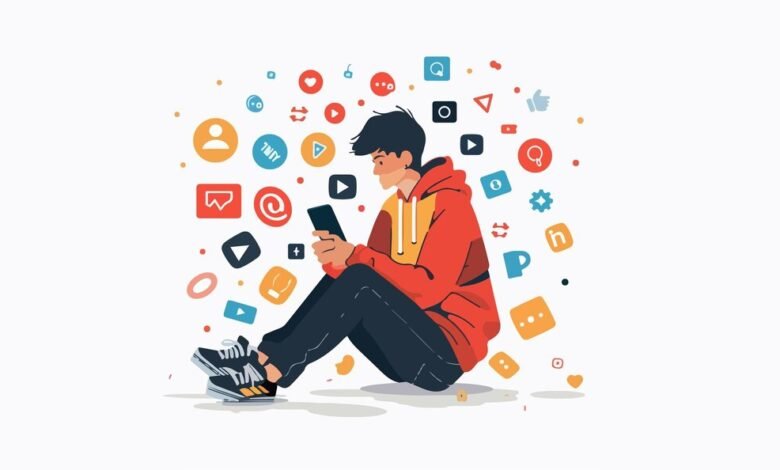Disadvantages of Social Media

In today’s digital age, Disadvantages of Social Media has become an integral part of our lives. From Facebook to Instagram, Twitter to TikTok, people use these platforms to connect with friends, share experiences, and express their thoughts. While social media has many benefits, such as fostering connections and providing access to information, it also comes with significant drawbacks. This article explores the disadvantages of social media and how it can impact our lives, especially our mental health, relationships, and overall well-being.
Distorted Reality
One of the main disadvantages of social media is that it often presents a distorted version of reality. People tend to share only the highlights of their lives, showcasing moments of happiness, beauty, and success. This creates an illusion that everyone else’s life is perfect. For young people, this can lead to feelings of inadequacy and low self-esteem. They may compare their everyday struggles to the carefully curated lives of influencers and celebrities, feeling pressure to meet unrealistic standards.
Cyberbullying
Cyberbullying is another significant issue associated with social media. Unlike traditional bullying, which typically occurs in person, cyberbullying happens online and can be relentless. Bullies can hide behind screens, making it easier for them to harass others without facing consequences. Victims of cyberbullying often experience anxiety, depression, and social withdrawal. This can have severe impacts on their mental health and academic performance.
Addiction and Distraction
Social media can be addictive. Many users find themselves scrolling through feeds for hours without realizing how much time has passed. This addiction can lead to distraction from important tasks, such as studying, working, or spending time with family and friends. People may prioritize their online presence over real-life interactions, which can harm relationships and create a sense of loneliness, even when they are constantly “connected” online.

Fear of Missing Out (FOMO)
The phenomenon known as “Fear of Missing Out” (FOMO) is prevalent in the age of social media. Seeing friends and acquaintances post about events, parties, or vacations can create anxiety for those who are not included. This fear can push individuals to engage in activities they might not enjoy just to avoid feeling left out. FOMO can lead to overcommitment and stress, as people try to keep up with everything happening around them.
Impact on Mental Health
Numerous studies have shown a link between social media use and mental health issues. People who spend excessive time on social media are more likely to experience symptoms of anxiety and depression. The constant comparison to others, exposure to negative comments, and pressure to maintain a certain image can take a toll on mental well-being. Moreover, the validation that comes from likes and comments can create a cycle of dependence, where individuals feel the need to seek approval from others constantly.
Privacy Concerns
Social media platforms often collect vast amounts of personal information from users. This data can be used for targeted advertising or even sold to third parties. Many users are unaware of the extent to which their data is shared and the potential risks involved. Privacy breaches and data leaks have become common, leading to identity theft and other cybercrimes. The lack of privacy can make users feel vulnerable and exposed, affecting their trust in online interactions.
Materialism and Consumerism
Social media promotes a culture of materialism and consumerism. Users are frequently bombarded with advertisements and posts showcasing luxurious lifestyles, trendy products, and unattainable beauty standards. This exposure can lead to an insatiable desire for material possessions and status symbols. Many young people, influenced by what they see online, may prioritize buying expensive items over saving money or investing in experiences that truly matter.
Decreased Productivity

Social media can significantly decrease productivity, especially for students and professionals. The allure of constant notifications and updates can distract individuals from completing tasks. For students, spending too much time on social media can interfere with studying and homework, leading to poor academic performance. In the workplace, employees may find themselves distracted by personal social media accounts, reducing overall efficiency and effectiveness.
Lack of Face-to-Face Interaction
As people spend more time on social media, face-to-face interactions have diminished. While online communication is convenient, it lacks the depth and emotional connection of in-person conversations. This shift can lead to misunderstandings and a sense of disconnection from others. Relationships may suffer as individuals prioritize online interactions over meaningful real-life connections, resulting in loneliness and isolation.
Conclusion
In while social media offers various benefits, it also comes with numerous disadvantages that can impact our lives significantly. From distorting reality and facilitating cyberbullying to fostering addiction and negatively affecting mental health, the consequences of social media use are profound. As we navigate the digital landscape, it is essential to be aware of these drawbacks and strive for a balanced approach to social media. Taking breaks, setting boundaries, and prioritizing real-life connections can help mitigate these negative effects, allowing us to enjoy the benefits of social media without compromising our well-being.
FAQs
1: What are the main disadvantages of social media?
The main disadvantages of social media include distorted perceptions of reality, cyberbullying, addiction and distraction, negative impacts on mental health, privacy concerns, and the promotion of materialism and consumerism.
2: How does social media contribute to mental health issues?
Social media can lead to mental health issues by fostering feelings of inadequacy through constant comparison with others, exposing users to cyberbullying, and creating a reliance on social validation through likes and comments. This can result in anxiety, depression, and low self-esteem.
3: What is cyberbullying, and how is it related to social media?
Cyberbullying is a form of bullying that occurs online, often through social media platforms. It allows bullies to harass and intimidate their victims anonymously, leading to significant emotional distress for the victims, including anxiety, depression, and social isolation.
4: Can social media addiction affect productivity?
Yes, social media addiction can significantly decrease productivity. Users may find themselves distracted by constant notifications and scrolling, which can interfere with completing tasks at work or school. This can result in lower performance and missed deadlines.
5: How can I reduce the negative effects of social media on my life?
To reduce the negative effects of social media, consider taking regular breaks from social media, setting specific time limits for usage, prioritizing face-to-face interactions, and being mindful of the content you consume. This can help improve your mental health and overall well-being.
